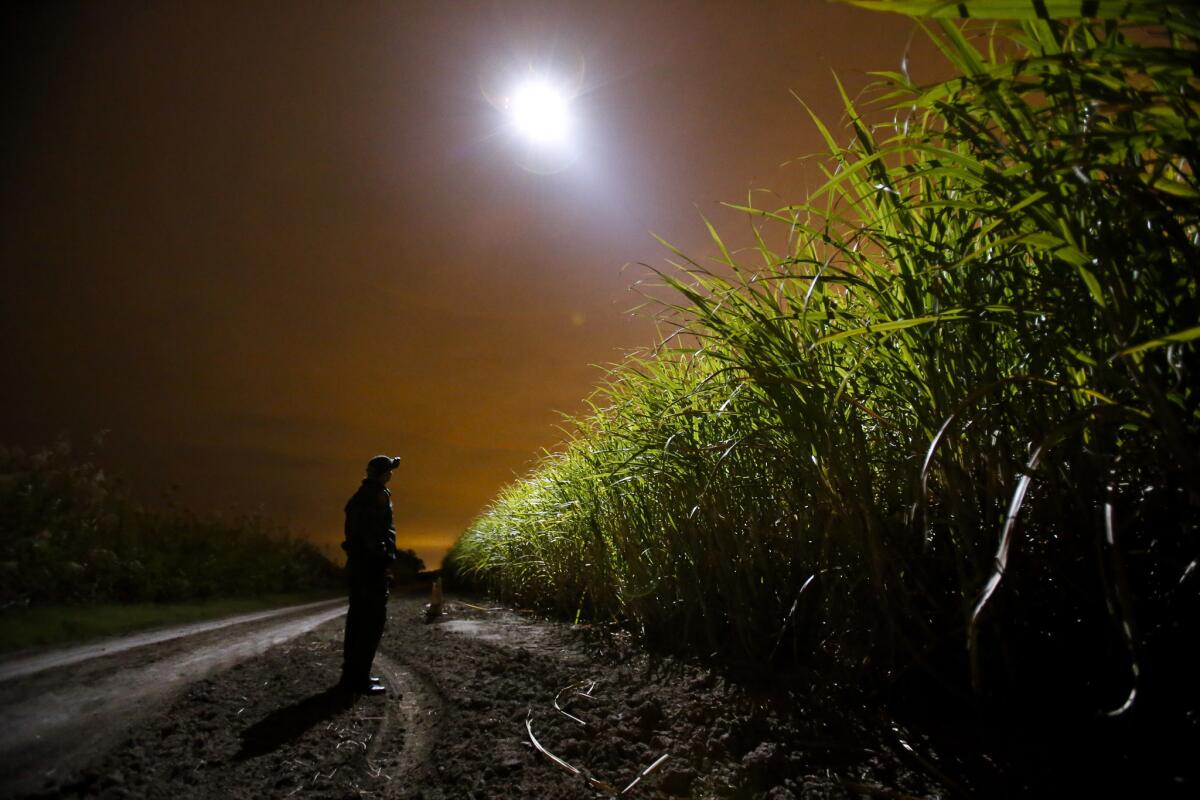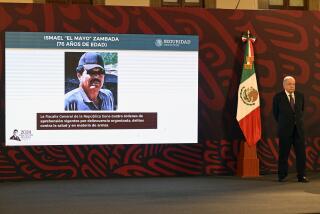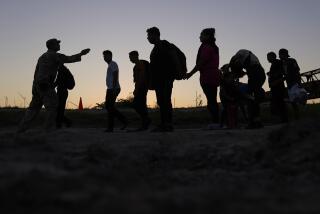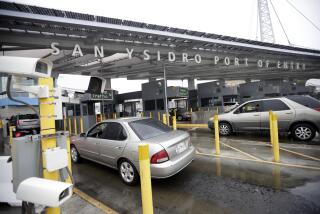Border Patrol needs to crack down on internal corruption, report says

A Border Patrol agent along the Mexico border near McAllen, Texas, in November.
U.S. Customs and Border Protection, the nation’s largest law enforcement agency, is vulnerable to “systematic corruption” by drug cartels, smugglers and other criminals, and investigations of its internal abuses are “chronically slow,” according to a Homeland Security Department report that reveals glaring problems in the agencies that police the nation’s borders.
The abuses are so widespread that Customs and Border Protection, the parent agency of the Border Patrol, should add nearly 350 criminal investigators to target internal corruption and the use of excessive and unnecessary force against migrants, the report concludes. That would boost the internal affairs roster by nearly 166%.
Arrests of border agents and customs officers “far exceed, on a per capita basis, such arrests at other law enforcement agencies,” the 29-page report notes.
“Until this is reversed, [Customs and Border Protection] remains vulnerable to corruption that threatens its effectiveness and national security,” warns the report, which was requested by Homeland Security Secretary Jeh Johnson.
The scathing assessment by the Homeland Security Advisory Council, an independent group that reports to Johnson, also is the latest to slam the Border Patrol for lack of accountability for hundreds of shootings by agents.
It calls for new rules to bar Border Patrol agents from shooting people who are unarmed or who don’t present a deadly threat. It also urges officials to revise policies to emphasize that the “overarching responsibility is to preserve human life” and to specifically restrict agents from shooting at moving vehicles and people throwing rocks or other objects.
The Los Angeles Times reported last year that some Border Patrol agents stepped in front of cars to justify shooting at drivers, and had opened fire on people throwing rocks from across the border in Mexico when agents could have moved out of harm’s way.
In May, the Customs and Border Protection internal affairs office absolved dozens of Border Patrol agents of criminal misconduct in 64 shooting incidents between January 2010 and October 2012, including 19 that resulted in deaths. The Justice Department is still considering charges in three other cases.
Critics along the Southwest border and in Mexico long have argued that the Border Patrol operates with little transparency or accountability.
Indeed, one of the report’s recommendations is that agents and officers “must wear visible name tags identifying their last name on all uniforms at all times,” a practice that critics say is often ignored. A video posted online of a 21-year-old woman in New York state being Tased at a roadside checkpoint last month shows a Border Patrol supervisor wearing a green tactical vest with no visible name tag.
William J. Bratton, the former LAPD chief who is now New York City police commissioner, and former Drug Enforcement Administration head Karen Tandy, led the eight-member panel that produced the report after scrutinizing Border Patrol records and interviewing officials and advocacy groups that operate along the border.
They recommended Customs and Border Protection increase its current staff of 207 investigators at internal affairs to 550 to beef up investigations of corruption and abuse.
Internal affairs is “woefully understaffed,” Tandy said Monday while presenting the panel’s recommendations to the council.
Customs and Border Protection is in the “awkward position” of urging similar agencies around the world to adopt a “robust” internal affairs office, without having an adequately staffed office to police its own integrity and professionalism, the report notes.
“This needs to be rectified as expeditiously as possible,” it adds.
At the same time, “true levels of corruption” are not known. “This means that pockets of corruption could fester … potentially for years.”
The Homeland Security Advisory Council, which is chaired by former FBI and CIA director William Webster, voted unanimously Monday evening to send the report to Johnson, the Homeland Security chief. The Los Angeles Times obtained a copy after it was entered into the council’s official proceedings.
Customs and Border Protection is the largest police force in the country, with about 44,000 armed officers who patrol the borders and guard ports of entry and border crossings. But its internal affairs unit, with 207 investigators, is far smaller than other major law enforcement entities.
The second-largest police force, the New York Police Department, has 34,500 sworn officers and about 550 in internal affairs.
The report praised the efforts of R. Gil Kerlikowske, who was named commissioner of Customs and Border Protection last year, to improve policies and training for when agents can use deadly force.
But it said the policy should add an opening statement that says: “CBP values human life and the dignity of every person and that the primary duty of every CBP officer/agent is the preservation of human life.”
Rules issued last year required agents to seek cover or move back, when possible, from people throwing rocks. The rules urged agents to seek alternatives to opening fire, following guidelines used by most domestic police departments.
But the review panel said agents and officers should be expressly prohibited from firing at vehicles unless the driver or passenger presented a mortal threat, the panel said.
Agents also should be prohibited from opening fire if bystanders are nearby. The panel also called for a stricter prohibition on deadly force against people throwing objects at agents.
In a statement Tuesday, Kerlikowske said many of the panel’s recommendations highlighted efforts “already implemented or underway.”
“I am committed to continuing the progress made in the last year and to continue our work to earn the trust and respect of the American public and of the communities we work within,” Kerlikowske said.
Shawn Moran, vice president of the union that represents most Border Patrol agents, challenged the recommendation to add hundreds of internal affairs investigators.
“I think the money can probably be better spent,” Moran said in a phone interview from San Diego. “We don’t condone any type of abuse or corruption. We want to see that gone as much as anybody.”
Vicki B. Gaubeca, co-chair of the Southern Border Communities Coalition, a network of advocacy organizations based across the Southwest, said the report showed how Customs and Border Protection “falls short of law enforcement best practices” and needed to change.
She said the recommendations would help change the Border Patrol “culture of ‘we need to do our job at whatever cost and the only life that seems to be valued is the life of the agent,’” Gaubeca said.
Twitter: @ByBrianBennett
MORE ON THE BORDER PATROL:
Border Patrol absolves itself in dozens of cases of lethal force
Border Patrol sued over conditions in short-term detention cells
Arizona border town ‘like a war zone all the time,’ protesting residents say
More to Read
Sign up for Essential California
The most important California stories and recommendations in your inbox every morning.
You may occasionally receive promotional content from the Los Angeles Times.











